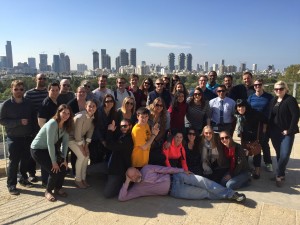Israel Reflections 2015: Day 7 — The Rabin Center
On the beginning of day seven of our trip (our last day!!), we visited the Rabin Center museum. This museum commemorates the life and career of late Prime Minister Yitzhak Rabin through telling the story of Israeli history. And the view from the Center over Tel Aviv (pictured below) cannot be beat!
Student William Nash shares his personal reaction to the Rabin museum:
“We began our last day in Israel by visiting the Rabin Center Museum in Tel Aviv. It was a nice morning—warm, with an easy, steady breeze. Standing out on the balcony, we overlooked the  Tel Aviv skyline beaming just beneath the prominence of the late-morning Mediterranean sun. It was a picture of peace. But at the time I didn’t appreciate the profound character and meaning of the ambiance. To me, it was a reprieve from constant bustle of the trip. And it was the perfect opportunity to take some last-minute pictures.
Tel Aviv skyline beaming just beneath the prominence of the late-morning Mediterranean sun. It was a picture of peace. But at the time I didn’t appreciate the profound character and meaning of the ambiance. To me, it was a reprieve from constant bustle of the trip. And it was the perfect opportunity to take some last-minute pictures.
